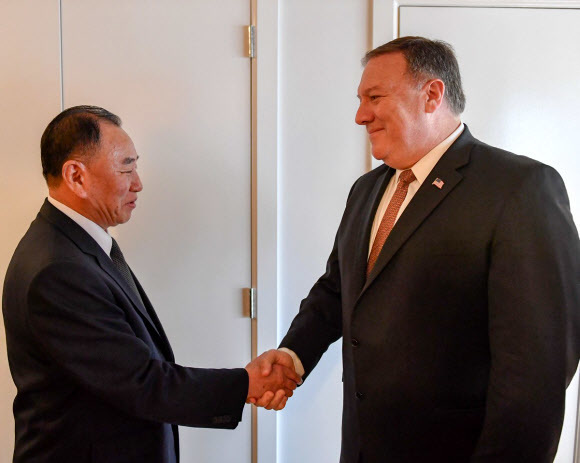Posted on : Nov.8,2018 17:18 KST
Modified on : Nov.8,2018 17:43 KST
 |
|
US Secretary of State Mike Pompeo and Workers‘ Party of Korea (WPK) Vice Chairman Kim Yong-chol shake hands in New York during the latter’s US visit on May 31. (Pompeo’s Twitter account)
|
The North Korea-US high-level talks that were supposed to be held on Nov. 8 were abruptly canceled. On Nov. 7, the US State Department said the two sides would “reconvene when our respective schedules permit.”
Because the State Department’s announcement was made so suddenly, just one day before the meeting was scheduled to take place, interest is focusing on the reason for the delay. While that reason remains unclear for now, it’s possible to conjecture that this happened because there had not been adequate preliminary coordination between North Korea and the US prior to the meeting. Considering that Kim Yong-chol, vice chairman of the Workers' Party of Korea (WPK), was not seen at his planned layover in Beijing, China, on Nov. 6, it’s possible that North Korea suggested that the meeting be delayed after concluding that the concessions offered by the US were inadequate.
The high-level talks, despite their ultimate postponement, had attracted a great deal of interest for several reasons. First, one of the talks’ major agenda items was coordinating the schedule and location of the second North Korea-US summit, which is supposed to take place early next year. Another interesting point was that the US State Department, while announcing that the high-level talks would be held, said they would deal with the four pillar agreements reached during the North Korea-US summit in Singapore.
This was particularly noteworthy because two of the four points contained in the Singapore summit’s agreement, namely resetting North Korea-US relations and establishing peace on the Korean Peninsula, are areas that the two sides have not discussed yet and that could lead to the US easing its sanctions on North Korea.
North Korea has repeatedly expressed its displeasure with the US for failing to take action in these two areas. It’s possible that the two sides failed to reach a compromise there. This shows that the US needs to pay more heed to North Korea’s demands. But considering that the State Department’s announcement used very respectful language and stated that working-level conversations are continuing, the US seems determined to sustain dialogue. We hope that North Korea and the US will hurry to reschedule the meeting before momentum for dialogue falters.
Another big question is whether the results of the US midterm elections will have an impact on North Korea-US negotiations. For the present, it doesn’t look as if there will be any big changes. The Democrats seized control of the House of Representatives, but the Republicans kept the upper hand in the Senate, which has a major influence on foreign policy.
It is possible, however, that the Democrats could use their position in the House to put a check on the Trump administration’s North Korea policy. That could slow down the pace of denuclearization while also increasing uncertainty in North Korea-US negotiations. The South Korean government needs to keep a close eye on the situation and concentrate on serving as a mediator to ensure that the North Korea-US negotiations don’t get off track.
Please direct comments or questions to [english@hani.co.kr]






